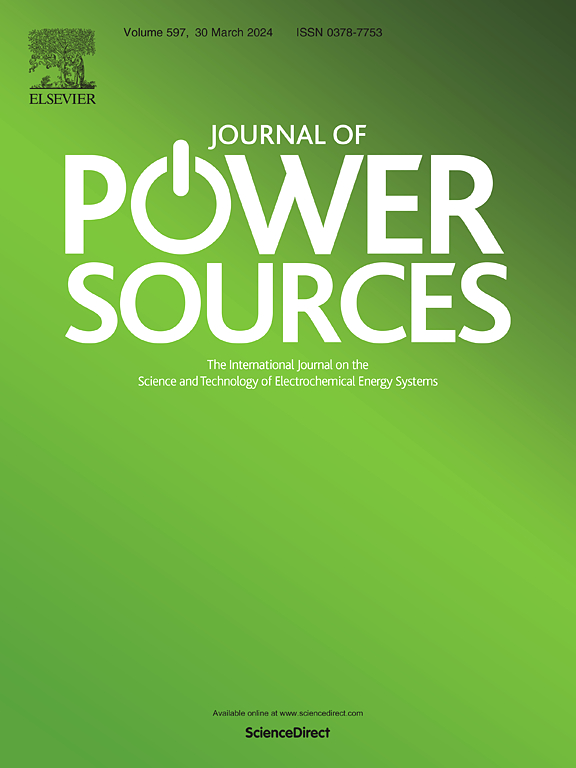In-situ measurement of the thermophysical properties of cylindrical batteries under calibrated iso-flux condition
IF 8.1
2区 工程技术
Q1 CHEMISTRY, PHYSICAL
引用次数: 0
Abstract
The thermophysical properties of lithium-ion batteries are significant in the thermal management and thermal safety for electric vehicles (EV). In this paper, an in-situ measurement method of the thermophysical properties focusing on the cylindrical batteries are proposed, in which the thermal protection setup is developed to enable radial thermal conductivity measurements under a calibrated iso-flux condition, with a minimal heat leakage by no more than 3 % during the test period. Based on the theoretical analysis, the radial thermal conductivity of the cylindrical battery is obtained during the transient temperature rise stage, whereas the specific heat is obtained by double exponential fitting during the stage close to the quasi-steady state. The radial thermal conductivity is calculated through matching the one-dimensional thermal simulation results with experimental data. It is indicated that the experimentally obtained specific heat ranges from 987.2 to 1076 J kg−1 °C−1, increasing proportionally as the radial thermal conductivity rises from 1.147 to 1.250 W m−1 °C−1 with the temperature ranging from −15 °C to 45 °C. This method possesses the advantages of simultaneous determination of specific heat and normal thermal conductivity with reduced test time and augmented accuracy, which would have profound impact in the analysis and design of battery thermal management.
锂离子电池的热物理性质对电动汽车(EV)的热管理和热安全至关重要。本文提出了一种以圆柱形电池为重点的热物理性质原位测量方法,其中开发了热保护装置,以便在校准等流量条件下测量径向热导率,并在测试期间将热泄漏降至最低,泄漏量不超过 3%。根据理论分析,圆柱形电池的径向热导率是在瞬态温升阶段获得的,而比热则是在接近准稳态阶段通过双指数拟合获得的。径向热导率是通过将一维热模拟结果与实验数据相匹配计算得出的。结果表明,实验得到的比热在 987.2 至 1076 J kg-1 ℃-1 之间,随着径向热导率从 1.147 W m-1 ℃-1 上升到 1.250 W m-1 ℃-1,比热成比例增加,温度范围为 -15 ℃ 至 45 ℃。该方法具有同时测定比热和正常热导率、缩短测试时间和提高精度的优点,将对电池热管理的分析和设计产生深远影响。
本文章由计算机程序翻译,如有差异,请以英文原文为准。
求助全文
约1分钟内获得全文
求助全文
来源期刊

Journal of Power Sources
工程技术-电化学
CiteScore
16.40
自引率
6.50%
发文量
1249
审稿时长
36 days
期刊介绍:
The Journal of Power Sources is a publication catering to researchers and technologists interested in various aspects of the science, technology, and applications of electrochemical power sources. It covers original research and reviews on primary and secondary batteries, fuel cells, supercapacitors, and photo-electrochemical cells.
Topics considered include the research, development and applications of nanomaterials and novel componentry for these devices. Examples of applications of these electrochemical power sources include:
• Portable electronics
• Electric and Hybrid Electric Vehicles
• Uninterruptible Power Supply (UPS) systems
• Storage of renewable energy
• Satellites and deep space probes
• Boats and ships, drones and aircrafts
• Wearable energy storage systems
 求助内容:
求助内容: 应助结果提醒方式:
应助结果提醒方式:


